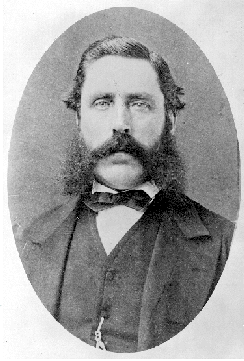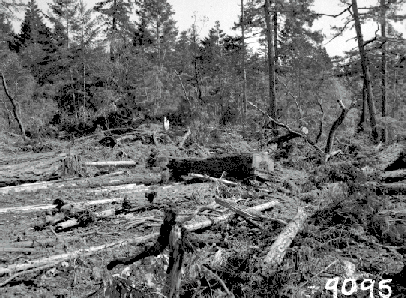| Race, Class, and Murder |
Our third case occurred in the winter of 1869. In late November a Native man arrived at the police barracks at Bastion Square. He was there to report that a settler had been found dead in his cabin at Becher Bay, today's Campbell's cove. When Inspector Bowden arrived at the cabin he found that a white man had been shot three times, once in the chin and twice in his sides. At first Bowden had thought the man was killed while he had been asleep. After searching the cabin Bowden was able to identify the man as Archibald Campbell. Bowden was able to find a diary, the last entry written on November 24th. This was an indication that the man was alive at least three days prior to the report. Looking through the diary Bowden found one entry where the man was visited by Natives.
On his way back to Victoria, Bowden stopped at Bentinck Island to question some Natives there. One of them said that he had visited Campbell's place a week earlier to shoot some grouse. When he returned to the beach he found that his canoe had drifted away. Campbell then approached him while carrying a gun and shot at him. While Campbell was reloading, he was able to get a hold of the gun and struggled with Campbell for control of it, during the struggle the gun went off, and in a moment of panic he threw the gun into the sea. Bowden was immediately puzzled as Campbell was shot three times.
Campbell was between 55 to 60 years of age, having come to Vancouver Island from Canada West (Ontario). He had arrived at the colony hoping for work the Cariboo mines, settling at Becher Bay after. The indian question, named Me-Shak was now charged with the murder of Campbell, and brought before a judge.
Chief Justice Needham presided over the case, providing Me-Shak with counsel though he still had little representation. Me-Shak had no representation and hardly spoke any English. The evidence presented was not very conclusive and Judge Needham reminded the jury that all they had was a confession, which may lead them to a verdict of justified homicide. The jury wasted no time and returned wit a verdict of "Wilful Murder." Judge Needham could do nothing but pronounce a death sentence, not before stating that he would try to intercede on Me-Shak's behalf. The judge's actions resulted in a few days of debate by the executive council. Public opinion of the delayed execution of Me-Shak was very negative, some even calling for the citizens to take matters into their own hands to kill Me-Shak. The emotion of the people would die down as no mention of what happened to Me-Shak was ever printed, there was no mention of him being hanged. It is very likely that Me-Shak was able to escape death and was just jailed and freed later.
The case of Campbell's death clearly shows the racial attitude of Victoria during this time, although the evidence was not substantial a white jury could not help themselves from condemning an indian for killing a white man in self defense. It would have been very likely that Me-Shak was unaware of the position he was in as he did not speak very much english. In the newspaper, white Victoria even suggested lynching Me-Shak themselves if the court would not.

To view photos and read newspaper articles concerning the evens of 1869 go to the Sources page
